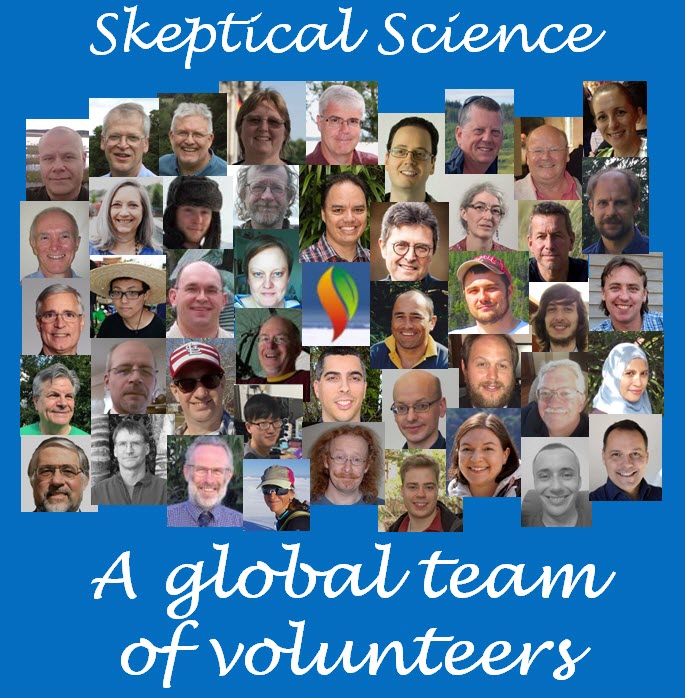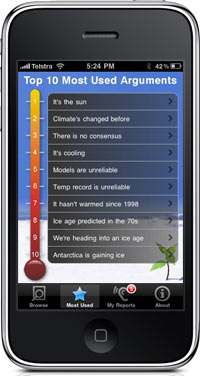
Skeptical Science is based on the notion that science by its very nature is skeptical. So what is skepticism? Skepticism is not doubt! Skepticism is the open-minded consideration of something based on the evidence. A skeptic doesn't have a preference for what the truth is, a preferred answer. They want to discover what the truth is based on the balance of all evidence. You look at all the facts before coming to a conclusion. In the case of climate science, our understanding of climate comes from considering the full body of evidence and being 'skeptical' for well over a century.
In contrast, climate denialism is closed minded. It thinks it knows the truth and wants to interpret the evidence to suit that. It has a preferred answer and wants to look at everything in that light. So it looks at small pieces of the puzzle while neglecting the full picture. Climate 'skeptics' vigorously attack any evidence for man-made global warming yet uncritically embrace any argument, op-ed, blog or study that supposedly refutes global warming. If you began with a position of climate 'skepticism' then cherry pick the data that supports your view while fighting tooth and nail against any evidence that contradicts that position, that's not genuine scientific skepticism.
If 99 pieces of evidence support an idea and 1 doesn't, a skeptic says 'that idea is probably true'. A denier says 'Ahah, that idea is false'.
Skepticism is a process, denial is a position.
So the approach of Skeptical Science is as follows. It looks at the many climate myths, exposes the techniques and fallacies used to distort the science and then puts them in their proper context by presenting the full picture. The climate myths are listed by popularity (eg - how often each argument appears in online articles) or with fixed numbers you can use for permanent references. For the more organised mind, they're also sorted into taxonomic categories.
If you're new to the climate debate (or are of the mind that there's no evidence for man-made global warming), a good starting point is Warming Indicators which lays out the evidence that warming is happening and the follow-up article, 10 Human Fingerprints on Climate Change which lays out the evidence that humans are the cause. More detail is available in empirical evidence that humans are causing global warming. Contrary to what you may have heard, the case for man-made global warming doesn't hang on models or theory - it's built on direct measurements of many different parts of the climate, past and present, all pointing to a single, coherent answer.
Another good starting point is the SkS climate graphics page, with each graphic featuring links to informative SkS material. Good introductions to climate science can be found at Global Warming in a Nutshell and The History of Climate Science. You could lose yourself for hours in those pages!
Note (December 2019): Our apps are currently "out of order" as they unfortunately are no longer maintained. They may still work if already installed but have vanished from the app stores. We are looking into options to make them available again. Please directly use the list of most used climate myths instead for the time being or download PDF versions via zip-files provided here. Thanks!
For smart phone users, the rebuttals to all the skeptic arguments are also availa ble on a number of mobile platforms. The first Skeptical Science app was an iPhone app, released in February 2010. This is updated regularly with the latest content from the website and very accessible in a beautifully designed interface by Shine Technologies. Shine Tech then went on to create a similar Android app which has some extra features missing from the iPhone version. A Nokia app was also created by Jean-François Barsoum (this was one of the 10 finalists in the Calling All Innovators competition).
ble on a number of mobile platforms. The first Skeptical Science app was an iPhone app, released in February 2010. This is updated regularly with the latest content from the website and very accessible in a beautifully designed interface by Shine Technologies. Shine Tech then went on to create a similar Android app which has some extra features missing from the iPhone version. A Nokia app was also created by Jean-François Barsoum (this was one of the 10 finalists in the Calling All Innovators competition).
As well as the list of rebuttals, Skeptical Science also has a blog where the latest research and developments are examined and discussed. Comments are welcome and the level of discussion is of a fairly high quality thanks to a fairly strict Comments Policy. You need to register a user account to post comments. One thing many regulars are not aware of is you can edit your user account details (to get to this page, click on your username in the left margin).
To keep up to date on latest additions to the website, sign up to receive new blog posts by email. There's an RSS feed for blog posts and for the engaged commenter, a feed for new user comments. We recommend you follow Skeptical Science on Twitter to keep up with the latest blog posts and other interesting climate links. In November 2022 we also set up a presence on Mastodon. Blog posts from Skeptical Science and relevant articles from many other reliable sources are also shared in a steady stream via our Facebook page.
For those wondering about who runs Skeptical Science, the website was founded by John Cook, a Senior Research Fellow with the Melbourne Centre for Behaviour Change at the University of Melbourne and adjunct faculty at George Mason University. John originally obtained a Bachelor of Science at the University of Queensland, achieving First Class Honours with a major in physics.
John is the author of a number of books and scientific papers including being lead-author of the paper Quantifying the Consensus on anthropogenic global warming in the scientific literature, which was tweeted by President Obama and was awarded the best paper published in Environmental Research Letters in 2013. In 2014, John won an award for Best Australian Science Writing, published by the University of New South Wales. In the summer of 2016 John finished his PhD in cognitive psychology, researching how people think about climate change.
There are many more who make invaluable contributions to Skeptical Science with a number of authors who write blog posts, rebuttals and other articles. They contribute by moderating the comments sections, editing and proofreading posts, sharing information with visitors, responding to emails, and providing technical support. There are also many regular commenters whose feedback has helped to improve and hone the website's content. Translators from all over the world have translated selected content into 20 different languages.
In 2011, Skeptical Science won the Australian Museum Eureka Prize for Advancement of Climate Change Knowledge. In May 2016 Skeptical Science received the "Friend of the Planet" award from the National Center of Science Education (NCSE).
Operational expenses to maintain the website and the funds to support our projects are currently (May 2023) still covered by a combination of internal funding provided by team members as well as some regular small-scale reader contributions. John Cook has no affiliations with any organisations or political groups other than academic institutions such as Melbourne University. Find more details on our "about us" page.
Update April 2021 - An interactive version of The Story of Skeptical Science
For the 2020 Fall Meeting of the American Geophysical Union (AGU) John Cook and Bärbel Winkler submited an abstract to session SY043 - Communication of Science - Practice, Research and Reflection convened by Heidi Roop, Priyanka Kushwaha, Kristin Timm and Erin Leckey. It seemed a good fit to submit "The Story of Skeptical Science" to, something we had also done earlier in 2020 for a comparable session at the European Geosciences Union (virtual) meeting. The EGU-presentation consisted of a "display" - basically a PDF created from a PPTX-presentation accompanied by a live chat-session. At AGU it was an "eLightning" session, which was a combination of a 3 minute talk and an interactive "iPoster". So, while the content is basically the same, the format of the presentation is completely different. You can check it out yourself here or by clicking on the poster's screenshot. If the iPoster doesn't load, you can try this "mock up" PPSX-version instead.
As the presentation shows, Skeptical Science has evolved from a small blog into a community of intelligent, engaged people with a commitment to science and our climate since its creation in 2007. Many of the contributors are working scientists who have many published scientific papers to their name. All the work is done as volunteers and a running joke among the author community is that we are being paid peanuts and they haven't even been delivered yet!
In August 2017 we published a series of posts to highlight SkS' 10th birthday. This series of short articles gives a good overview of how SkS evolved from a one-author-blog to the global volunteer effort it is today.
Note: to access the earlier version of this post and to read the comments posted until April 2015 please check out Newcomers start here
Posted by John Cook on Thursday, 29 April, 2021
 |
The Skeptical Science website by Skeptical Science is licensed under a Creative Commons Attribution 3.0 Unported License. |